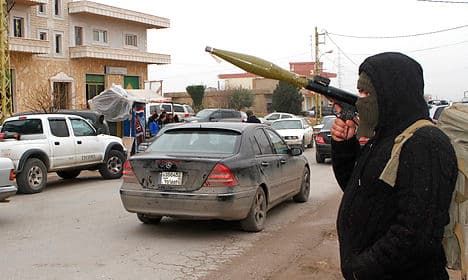Terror threat in Denmark has increased: PET

A new report from the Danish Security and Intelligence Service (PET) says that the number of Danes fighting in Syria and Iraq has increased, as has the risk of a terror attack.
Using a small but significant change in language, domestic intelligence agency PET has warned of a greater risk of a terror attack in Denmark. The latest threat level assessment from PET’s Center for Terror Analysis (CTA) states that “the terror threat against Denmark is serious, but the risk of being the victim of a terror attack in Denmark is limited”. In CTA’s previous threat level assessment, the agency called the risk of a terror attack “very limited”. The head of PET, Jens Madsen, confirmed to broadcaster DR that the change in language was intentional. “I want to stress that the risk is still limited, but we have changed the formulation because of negative developments in the current terror situation. This is particularly due to the fact that we are continuing to see a stream of people leaving Denmark for the conflict in Syria and Iraq,” he said. The CTA report also upped the estimation for the confirmed number of Danes who have fought in Syria from 100 to 110, though PET said that the actual number is likely higher. The report also said that at least 16 Danes have been killed while fighting in Syria and Iraq. CTA wrote that many leave Denmark because of the impression that Islam is under attack by the West, a message that was on display earlier this week in Copenhagen when supporters of Hizb ut-Tahir held a rally in support of Sharia Law and against what they called “Danish politicians’ attacks against Islam and Muslims”. The PET report comes in the wake of three Isis supporters being arrested in Saudi Arabia for shooting and wounding a Danish national. Denmark is currently participating in an international effort to fight Isis in Syria.
Comments
See Also
Using a small but significant change in language, domestic intelligence agency PET has warned of a greater risk of a terror attack in Denmark.
The latest threat level assessment from PET’s Center for Terror Analysis (CTA) states that “the terror threat against Denmark is serious, but the risk of being the victim of a terror attack in Denmark is limited”.
In CTA’s previous threat level assessment, the agency called the risk of a terror attack “very limited”.
The head of PET, Jens Madsen, confirmed to broadcaster DR that the change in language was intentional.
“I want to stress that the risk is still limited, but we have changed the formulation because of negative developments in the current terror situation. This is particularly due to the fact that we are continuing to see a stream of people leaving Denmark for the conflict in Syria and Iraq,” he said.
The CTA report also upped the estimation for the confirmed number of Danes who have fought in Syria from 100 to 110, though PET said that the actual number is likely higher. The report also said that at least 16 Danes have been killed while fighting in Syria and Iraq.
CTA wrote that many leave Denmark because of the impression that Islam is under attack by the West, a message that was on display earlier this week in Copenhagen when supporters of Hizb ut-Tahir held a rally in support of Sharia Law and against what they called “Danish politicians’ attacks against Islam and Muslims”.
The PET report comes in the wake of three Isis supporters being arrested in Saudi Arabia for shooting and wounding a Danish national.
Denmark is currently participating in an international effort to fight Isis in Syria.
Join the conversation in our comments section below. Share your own views and experience and if you have a question or suggestion for our journalists then email us at [email protected].
Please keep comments civil, constructive and on topic – and make sure to read our terms of use before getting involved.
Please log in here to leave a comment.